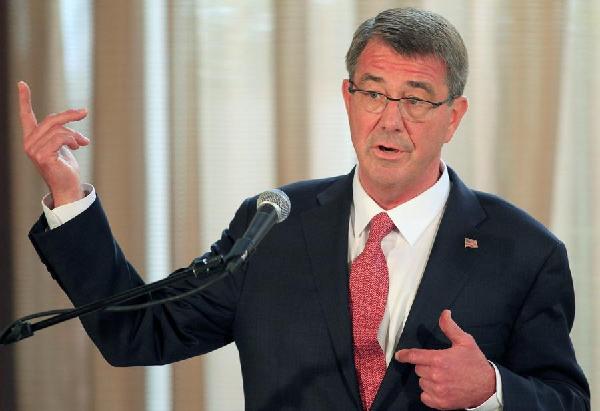 |
|
Visiting US Defense Secretary Ash Carter gestures during a joint press conference with his Filipino counterpart Voltaire Gazmin (not pictured) at the presidential palace in Manila April 14, 2016. [Photo/Agencies] |
In the choppy waters of the South China Sea, China and the United States are entangled in a complex power struggle. The two major powers have accused each other of "militarizing" the South China Sea disputes. In the crosshair of this power struggle is the Philippines. As China's neighbor and the US' long-time ally, the Philippines has been strategic in its unique role.
According to China, the US is the main source of militarization in the South China Sea. This has resulted in disputes because of the US' regular deployment of advanced American aircraft and warships pursuing "freedom of navigation operations" in the region. So far, the US has conducted two major "freedom of navigation operations" in the South China Sea using guided-missile destroyers USS Lassen in October 2015 and USS Curtis Wilbur in January 2016. The US Navy has also strengthened its military presence in the region and its warships have made port calls to Asian allies, particularly the Philippines, Japan, South Korea, Thailand and Australia.
The US and the Philippines recently conducted their annual joint military exercise, called Balikatan 2016(Shoulder-to-Shoulder 2016). The primary focus of the drill was to help the Philippine military improve its capability for "territorial defense" against the backdrop of rising tensions in the South China Sea. This year's drill was the 32nd Balikatan between the two allies, but it also involved two other US military allies, Japan and Australia.
The Philippines has been the main focus of the US since it's the only Washington ally that has a dispute with China in the South China Sea. The Philippines is also the US' front line state in the pursuit of enacting the US policy in the South China Sea, because it provides the US military effective access to the waters as Washington implements its "rebalance to Asia" strategy.
For the US, its increased military presence in the South China Sea is essential to fulfill its security commitments to its allies, particularly the Philippines. Though Washington publicly declares that its increased naval and air presence in the South China Sea is not aimed at confronting Beijing militarily, China regards the US military presence as a form of strategic encirclement of the country. The fear of US encirclement, in turn, has prompted China, too, to increase its presence in the South China Sea by building islands on the seven reefs of Nansha Islands (called Spratlys in the Philippines). The US is convinced that China's "artificial" islands in the Nansha Islands can have no other but military purpose.
China and the US have recently intensified their power struggle in the South China Sea because of their competing security interests and strategic outlooks. Though the South China Sea is not yet a military problem, increased military activities by the two major powers have increased the risk of unintended military conflicts in the area.
Manila has a pivotal role to play, in preventing or exacerbating the possibility of an unintended military conflict between the two giants. To repair its damaged ties with Beijing, Manila has to resume direct bilateral talks by reopening channels of communication at the highest levels of decision-making. Though public opinion in the Philippines continues to reject Chinese buildup in the Nansha Islands, Filipinos continue to admire China's culture, civilization and economic prosperity as evidenced by the growing number of Filipino visits and investments in China. In fact, most of the presidential candidates for the May 2016 Philippine elections say they would improve Manila's relations with Beijing if elected.
But if the Philippines fails to improve its relations with China while continuously enhancing its defense alliance with the US, it can become a catalyst for the proverbial "Thucydides trap" in the vast sea where China and the US could collide.
The author teaches international studies at Miriam College in Quezon city of the Philippines, and is director of the Center for Intelligence and National Security Studies. Source: chinausfocus.com

I’ve lived in China for quite a considerable time including my graduate school years, travelled and worked in a few cities and still choose my destination taking into consideration the density of smog or PM2.5 particulate matter in the region.